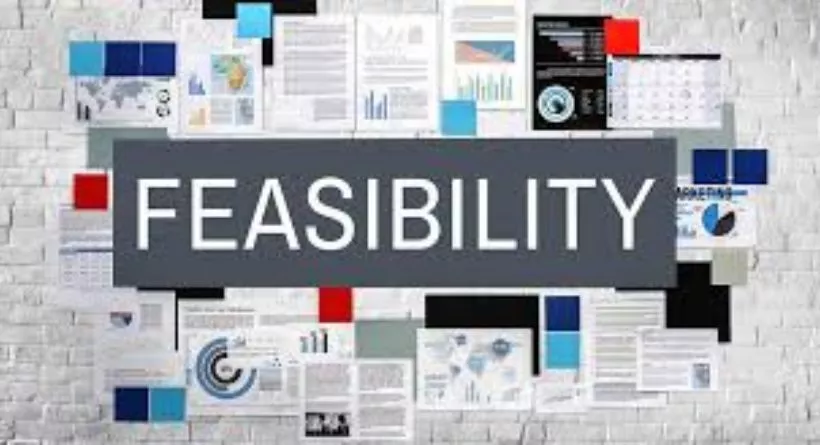Are you planning to launch a small business, but feeling uncertain about its prospects and wondering if it’s even worth the effort? This is a common problem that many aspiring entrepreneurs face. In this blog post, we aim to provide you with a solution by introducing the concept of a Feasibility Study, a crucial step in the planning process for any small business. By conducting a Feasibility Study, you can assess the viability of your business idea and make an informed decision about whether or not to proceed. We will provide an overview of how to conduct a Feasibility Study and show you how this valuable tool can save you time, money, and potential disappointment down the line. We understand that the uncertainty of your business’s success can be a major pain point, so let’s dive into the process of evaluating your idea and determining its potential for success.
Also Read: How to Renew Your TSA PreCheck
What is a Feasibility Study?

Definition of Feasibility Study
A Feasibility Study is a comprehensive analysis conducted to evaluate the viability of a business idea or project. This assessment helps entrepreneurs determine whether their idea has the potential to be successful before investing significant time and resources into it. By analyzing various aspects of the business, a Feasibility Study can provide valuable insights into the practicality and profitability of the proposed venture.
Importance of Feasibility Study in Small Business Planning
In the world of small business, conducting a Feasibility Study is crucial for various reasons. First and foremost, it minimizes the risk of failure by identifying potential challenges and roadblocks. It also helps you understand the market landscape and determine if there is a demand for your product or service. Furthermore, a Feasibility Study can be a valuable tool when seeking funding or partnerships, as it demonstrates to potential investors that you have thoroughly researched and planned your venture.
Key Components of a Feasibility Study
There are several essential elements to consider when conducting a Feasibility Study, each of which contributes to a comprehensive understanding of your business idea’s potential.
Market Analysis: This component involves researching your target customers, analyzing competitors, and evaluating market trends. Understanding the market landscape helps you identify the demand for your product or service and any gaps you can fill.
Technical Feasibility: Assess the required resources, technology, and infrastructure needed to bring your idea to life. This includes evaluating production processes, equipment, and other logistical factors necessary for the successful execution of your business plan.
Financial Feasibility: Estimating costs, revenues, and profitability is critical to ensure your business can generate a sufficient return on investment. A thorough financial analysis will help you determine whether your idea is financially viable and sustainable in the long run.
Organizational and Operational Feasibility: This aspect evaluates the management and personnel requirements for your business, as well as any legal and regulatory considerations. Understanding these factors will help you prepare for potential challenges and ensure smooth operations.
How to Conduct a Feasibility Study

Market Analysis
Identifying target customers is the first step in conducting a market analysis for your Feasibility Study. Define your ideal customer by considering factors such as age, income, location, and interests. Knowing who your target customers are will help you tailor your product or service to their needs, ultimately increasing the likelihood of success.
Analyzing competitors is also crucial. Examine businesses that offer similar products or services to yours and identify their strengths and weaknesses. Understanding your competition will help you differentiate your offering and find ways to stand out in the market.
Evaluating market trends is another vital aspect of market analysis. Stay informed about industry developments and consumer preferences, as these can impact your business’s success. By keeping your finger on the pulse of the market, you can adapt your strategy to stay ahead of the curve.
Technical Feasibility
Assessing required resources is an essential component of technical feasibility. Determine what materials, equipment, and labor will be necessary to produce your product or deliver your service. Identifying these requirements early on will help you plan your operations and avoid potential obstacles.
Also Read: Who is Dee Dee Benkie, Wife of Paul Sorvino?
Evaluating technology and infrastructure needs is also critical. Consider the tools and systems required to support your business, such as software, hardware, or production machinery. Ensuring that you have the right technology in place will contribute to the efficiency and effectiveness of your operations.
Financial Feasibility
Estimating costs and revenues is a vital part of financial feasibility. Calculate your startup costs, including expenses such as equipment, inventory, and marketing. Also, project your ongoing operational costs and anticipated revenues. Having a clear financial picture will help you determine the profitability of your business.
Analyzing profitability and return on investment is crucial for understanding the financial viability of your business. Assess the potential return on investment by comparing your estimated revenues with your costs. This information will be invaluable when deciding whether to move forward with your business idea.
Organizational and Operational Feasibility

Evaluating management and personnel needs involves assessing the skills and expertise required to run your business. Consider the roles and responsibilities that will be necessary and determine if you have the expertise in-house or if you need to hire additional staff. Having a competent team in place is vital for your business’s success.
Assessing legal and regulatory requirements is another essential aspect of organizational and operational feasibility. Familiarize yourself with the laws and regulations that apply to your business, such as licenses, permits, and industry-specific regulations. Ensuring that your business complies with all legal requirements will help you avoid potential fines and legal issues.
Analyzing and Interpreting Feasibility Study Results
Identifying potential risks and challenges is a crucial step in analyzing your Feasibility Study results. By recognizing these obstacles, you can develop strategies to mitigate or overcome them, ultimately improving your chances of success.
Determining whether to proceed, modify, or abandon the business idea is a critical decision that arises from your Feasibility Study findings. Reflect on the data and insights gathered to make an informed choice. Sometimes, modifying your idea to address potential issues may be the best path forward.
When making decisions based on your Feasibility Study, consider the following tips:
- Be objective and realistic in evaluating the results.
- Seek input from experts or mentors to gain additional perspectives.
- Weigh the pros and cons of each option before making a final decision.
Remember that a well-conducted Feasibility Study can provide valuable insights, guiding you toward a more successful business venture. Don’t underestimate the importance of this vital step in your entrepreneurial journey.
Tips for Making Informed Decisions Based on Feasibility Study Findings
When making decisions based on your Feasibility Study findings, keep these tips in mind:
- Be objective and realistic in evaluating the results.
- Seek input from experts or mentors to gain additional perspectives.
- Weigh the pros and cons of each option before making a final decision.
Real-life Examples of Feasibility Studies in Small Businesses
Success stories of businesses that benefited from a Feasibility Study showcase the importance of this crucial step in planning. For instance, a small bakery owner conducted a thorough Feasibility Study before launching, allowing them to identify a niche market and optimize their product offerings. As a result, the bakery thrived and eventually expanded to multiple locations.
On the other hand, lessons can be learned from businesses that neglected a Feasibility Study. One entrepreneur decided to open a restaurant without conducting a market analysis, only to find that their chosen location had fierce competition and low demand for their specific cuisine. The restaurant ultimately closed, leaving the owner with significant financial losses.
Conclusion
A Feasibility Study is an essential tool for small businesses, providing valuable insights into the market, technical, financial, and organizational aspects of your business idea. By conducting a thorough analysis, you can identify potential risks and challenges, make informed decisions, and learn from the experiences of other entrepreneurs. Ultimately, taking the time to conduct a Feasibility Study increases your chances of success and paves the way for a thriving business. So, embrace the process and embark on your entrepreneurial journey with confidence and determination.
FAQs
What is a Feasibility Study?
Why is a Feasibility Study important for small businesses?
What are the key components of a Feasibility Study?
How do I interpret Feasibility Study results?
Can you provide examples of businesses that benefited from a Feasibility Study?
How do you write a feasibility study for a small business?
Clearly define your business idea and objectives.
Conduct market analysis, including identifying target customers, analyzing competitors, and evaluating market trends.
Assess the technical feasibility by examining required resources, technology, and infrastructure needs.
Analyze the financial feasibility by estimating costs and revenues, and evaluating profitability and return on investment.
Evaluate organizational and operational feasibility by assessing management and personnel needs, as well as legal and regulatory requirements.
Analyze and interpret the results, identify potential risks and challenges, and make informed decisions based on the findings.
What are the 3 parts of the feasibility study?
Market analysis: This part involves studying the target market, competition, and market trends.
Technical feasibility: This part assesses the required resources, technology, and infrastructure for the business idea.
Financial feasibility: This part focuses on estimating costs, revenues, profitability, and return on investment.
In addition to these three main parts, a comprehensive feasibility study also includes organizational and operational feasibility assessments.

